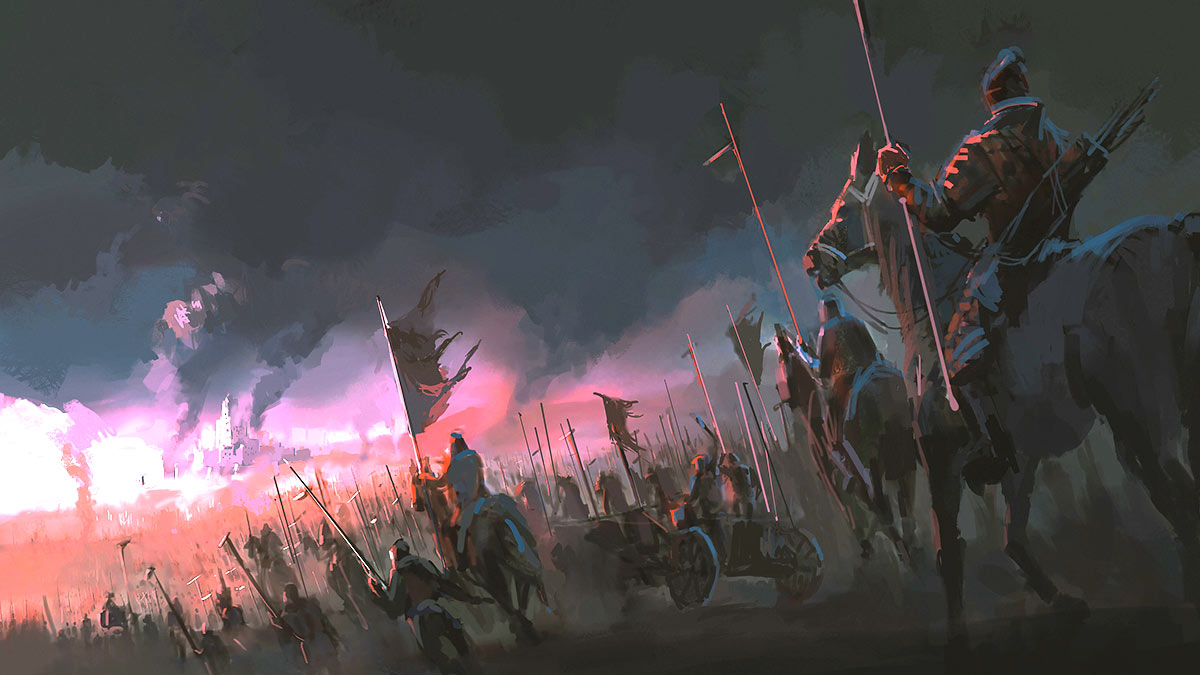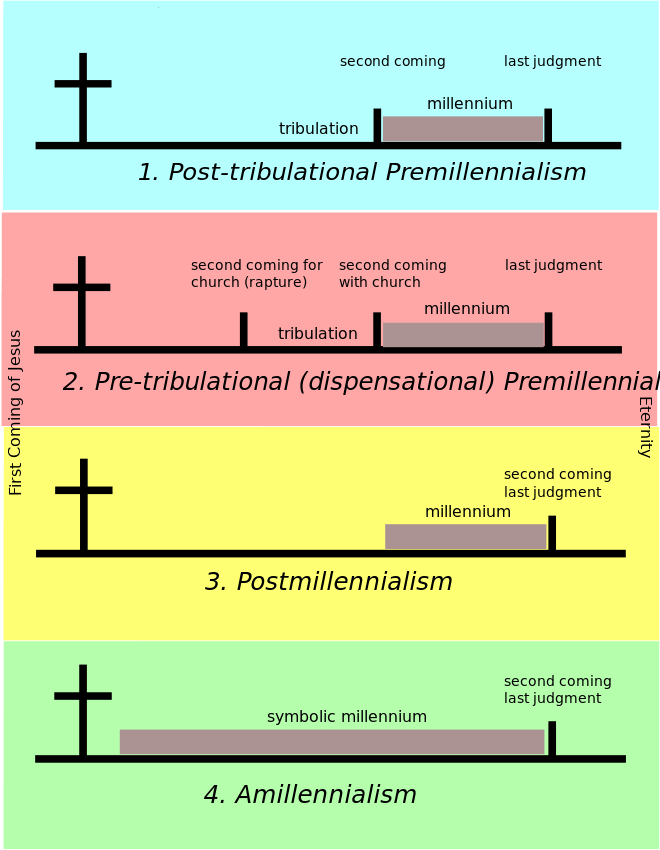Two-Age Eschaton chart
The Age to Come explained at Prophecy Course…
Strong’s Concordance
165. aión ►
aión: a space of time, an age
Original Word: αἰών, ῶνος, ὁ
Usage: an age, a cycle (of time), especially of the present age as contrasted with the future age, and of one of a series of ages stretching to infinity.
Scripture referring to “this age” only
Matthew 13:22
He also that received seed among the thorns is he that hears the word; and the care of this world (aión), and the deceitfulness of riches, choke the word, and he becometh unfruitful.
GRK: μέριμνα τοῦ αἰῶνος καὶ ἡ
NAS: and the worry of the world and the deceitfulness
KJV: of this world, and
INT: care the age and the
Matthew 24:3
And as he sat upon the mount of Olives, the disciples came unto him privately, saying, Tell us, when shall these things be? and what shall be the sign of thy coming, and of the end of the world (aión)?
GRK: συντελείας τοῦ αἰῶνος
NAS: and of the end of the age?
KJV: and of the end of the world?
INT: the completion of the age
Matthew 28:20
Teaching them to observe all things whatsoever I have commanded you: and, lo, I am with you always, even unto the end of the world (aión). Amen.
GRK: συντελείας τοῦ αἰῶνος
NAS: even to the end of the age.
KJV: the end of the world. Amen.
INT: completion of the age
Mark 4:19
And the cares of this world (aión), and the deceitfulness of riches, and the lusts of other things entering in, choke the word, and it becometh unfruitful.
GRK: μέριμναι τοῦ αἰῶνος καὶ ἡ
NAS: but the worries of the world, and the deceitfulness
KJV: of this world, and
INT: cares the of this life and the
Romans 12:2
And be not conformed to this world (aión): but be transformed by the renewing of your mind, that you may prove what is that good, and acceptable, and perfect, will of God.
I Corinthians 1:20
Where is the wise? where is the scribe? where is the disputer of this world? Has not God made foolish the wisdom of this world?
I Corinthians 2:6-8
Howbeit we speak wisdom among them that are perfect: yet not the wisdom of this world, nor of the princes of this world, that come to nought: But we speak the wisdom of God in a mystery, even the hidden wisdom, which God ordained before the world unto our glory: Which none of the princes of this world knew: for had they known it, they would not have crucified the Lord of glory.
II Corinthians 4:4
In whom the god of this world has blinded the minds of them which believe not, lest the light of the glorious gospel of Christ, who is the image of God, should shine unto them.
Galatians 1:4
Who gave himself for our sins, that he might deliver us from this present evil world, according to the will of God and our Father:
Ephesians 2:2
Wherein in time past you walked according to the course of this world (age), according to the prince of the power of the air, the spirit that now works in the children of disobedience:
I Timothy 6:17
Charge them that are rich in this world, that they not be high-minded, nor trust in uncertain riches, but in the living God, who gives us richly all things to enjoy;
Titus 2:12
Teaching us that, denying ungodliness and worldly lusts, we should live soberly, righteously, and godly, in this present world;
In the preceding verses, “this age” is temporal, describing our current age prior to Christ’s return. All these things seem to pass away upon His return.
Scripture referring to the “age to come” only
I Corinthians 6:9-10
Know you not that the unrighteous shall not inherit the kingdom of God? Be not deceived: neither fornicators, nor idolaters, nor adulterers, nor effeminate, nor abusers of themselves with mankind, nor thieves, nor covetous, nor drunkards, nor revilers, nor extortioners, shall inherit the kingdom of God.
I Corinthians 15:50
Now this I say, brethren, that flesh and blood cannot inherit the kingdom of God; neither does corruption inherit incorruption.
Galatians 5:21
Envyings, murders, drunkenness, revellings, and such like: of the which I tell you before, as I have also told you in time past, that they which do such things shall not inherit the kingdom of God.
Ephesians 5:5
For this you know, that no whoremonger, nor unclean person, nor covetous man, who is an idolater, hath any inheritance in the kingdom of Christ and of God.
I Thessalonians 2:12
That you would walk worthy of God, who has called you unto his kingdom and glory.
II Thessalonians 1:5
Which is a manifest token of the righteous judgment of God, that you may be counted worthy of the kingdom of God, for which you also suffer:
I Timothy 6:19
Laying up in store for themselves a good foundation against the time to come, that they may lay hold on eternal life.
II Timothy 4:18
And the Lord shall deliver me from every evil work, and will preserve me unto his heavenly kingdom: to whom be glory for ever and ever. Amen.
In contrast to “this age” the qualities assigned to the age to come are all eternal in nature. These references are clearly describing the future eschatological state of believers (and nonbelievers if you factor in the references to judgment).
Scripture illustrating the transition between both “this age” and “the age to come” (two ages)
Matthew 12:32
And whosoever speaks a word against the Son of Man, it shall be forgiven him: but whosoever speaks against the Holy Ghost, it shall not be forgiven him, neither in this world (aión), neither in the world (aión) to come.
GRK: τούτῳ τῷ αἰῶνι οὔτε ἐν
NAS: in this age or
KJV: in this world, neither in
INT: this the age nor in
Matthew 13:39-40, 49
The enemy that sowed them is the devil; the harvest is the end of the world (aión); and the reapers are the angels. As therefore the tares are gathered and burned in the fire; so shall it be in the end of this world (aión).
v39 N-GMS
GRK: θερισμὸς συντέλεια αἰῶνός ἐστιν οἱ
NAS: is the end of the age; and the reapers
KJV: the end of the world; and
INT: [the] harvest [the] completion of the age is
v40 N-GMS
GRK: συντελείᾳ τοῦ αἰῶνος
NAS: so shall it be at the end of the age.
KJV: the end of this world.
INT: completion of the age
Matthew 13:49 – So shall it be at the end of the world (aión): the angels shall come forth, and sever the wicked from among the just,
GRK: συντελείᾳ τοῦ αἰῶνος ἐξελεύσονται οἱ
NAS: it will be at the end of the age; the angels
KJV: the end of the world: the angels
INT: completion of the age will go out the
Luke 18:30
Who shall not receive manifold more in this present time, and in the world (aión) to come life everlasting.
GRK: ἐν τῷ αἰῶνι τῷ ἐρχομένῳ
NAS: time and in the age to come,
KJV: and in the world to come life
INT: in the age that is coming
Luke 20:34-35
And Jesus answering said unto them, The children of this world (aión) marry, and are given in marriage: But they which shall be accounted worthy to obtain that world (aión), and the resurrection from the dead, neither marry, nor are given in marriage:
v34 N-GMS
GRK: υἱοὶ τοῦ αἰῶνος τούτου γαμοῦσιν
NAS: of this age marry
KJV: The children of this world marry, and
INT: sons of the age this marry
v35 N-GMS
GRK: καταξιωθέντες τοῦ αἰῶνος ἐκείνου τυχεῖν
NAS: to attain to that age and the resurrection
KJV: that world, and
INT: having been accounted worthy to the age that to obtain
Mark 10:30
But he shall receive an hundredfold now in this time, houses, and brethren, and sisters, and mothers, and children, and lands, with persecutions; and in the world to come eternal life.
GRK: ἐν τῷ αἰῶνι τῷ ἐρχομένῳ
NAS: along with persecutions; and in the age to come,
KJV: and in the world to come eternal
INT: in the age which is coming
Ephesians 1:21
Far above all principality, and power, and might, and dominion, and every name that is named, not only in this world, but also in that which is to come:
References
Strong’s Concordance 165. BibleHub.com. Retrieved from https://biblehub.com/greek/165.htm
The Two Age Model (chart). The Riddleblog. Retrieved from http://kimriddlebarger.squarespace.com/the-two-age-model-chart/


